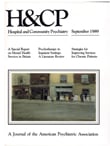Treating Patients "Doing Time": A Forensic Perspective
Abstract
This paper has described some inhospital strategies for dealing with problems caused by the delayed release of forensic patients. It is hoped that the paper will stimulate others to develop creative methods of addressing these problems.
Clinicians working in forensic settings have to be actively aware that their parameters are different from those of other psychiatric hospital settings, with a consequent impact on the treatment relationship. Clinicians must take the unique characteristics of the forensic discharge process into account and proactively develop methods for dealing with this process. To the extent that creative adjustments occur, treatment will be more effective and less stressful for all concerned.
Access content
To read the fulltext, please use one of the options below to sign in or purchase access.- Personal login
- Institutional Login
- Sign in via OpenAthens
- Register for access
-
Please login/register if you wish to pair your device and check access availability.
Not a subscriber?
PsychiatryOnline subscription options offer access to the DSM-5 library, books, journals, CME, and patient resources. This all-in-one virtual library provides psychiatrists and mental health professionals with key resources for diagnosis, treatment, research, and professional development.
Need more help? PsychiatryOnline Customer Service may be reached by emailing [email protected] or by calling 800-368-5777 (in the U.S.) or 703-907-7322 (outside the U.S.).



